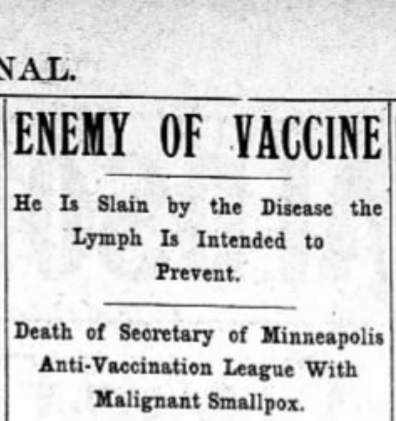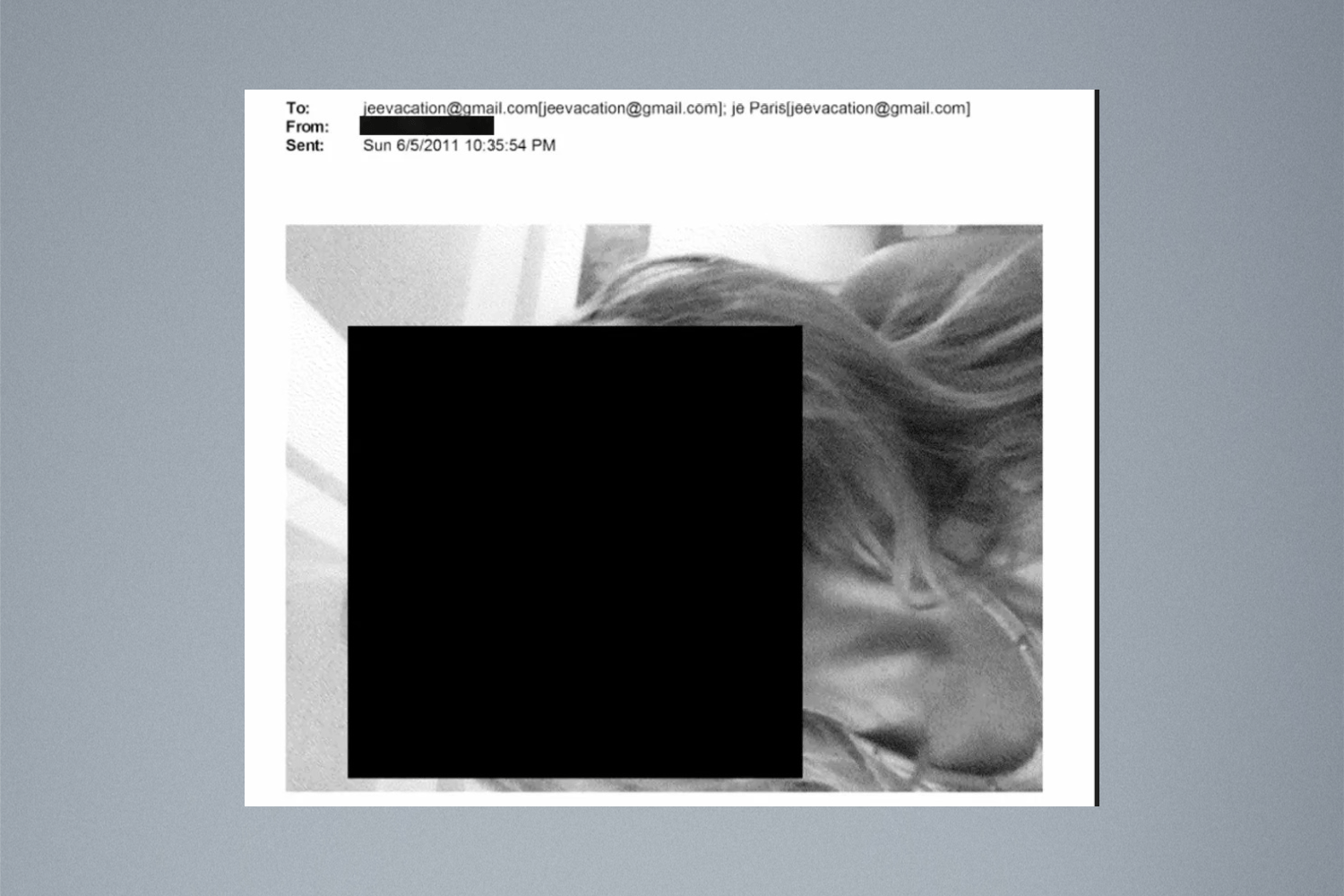Ironic and tragic COVID-19 deaths are everywhere these days.
Three prominent vaccine skeptics, two of them right-wing radio hosts, died from COVID in just the past few weeks. Examples like this can serve as visceral warning signs, sure, but they can also elicit gross schadenfreude among the eagerly vaccinated.
One Reddit group isn't concerned about the moral ambiguity of it all.
A historical/ironic virus death is currently trending on r/HermanCainAward, a popular subreddit named after former presidential candidate Herman Cain, who died of COVID nine days after attending a maskless 2020 Trump rally. "ENEMY OF VACCINE SUCCUMBS TO SMALLPOX," screams a 1903 article featured in the post, which goes on to describe the death of Charles Stevens… secretary of the Minneapolis Anti-Vaccination League.
Stevens's death is tied to a well-financed, extremely active turn-of-the-century movement.
The term "anti-vaccination league" first appeared in the Star Tribune in 1885, in a wire story about "a number of medical men" who attended a league meeting in New York City. Among the famous anti-vaxxers of the era: abolitionist Frederick Douglass, writer Leo Tolstoy, and playwright George Bernard Shaw, who called vaccinations "a peculiarly filthy piece of witchcraft."
In 1855, the Massachusetts legislature made vaccination a condition for attending school, F.J Vojta wrote in a 1980 Minneapolis Star opinion piece. Only 14 states passed similar laws by 1927, he notes, due in part to the efforts of anti-vax groups. Minnesota would experience its worst smallpox outbreak in 1924. Around 504 died; vaccines were never mandated. Nevertheless, the World Health Organization declared in 1979 that smallpox had been eradicated, a historic achievement for science and mankind. Yet anti-vax activity remains deathless, unlike those who propagate it:
NOW: MN Rep. Mary Franson urges thousands at State Capitol to resist COVID vaccines, mandates, saying they are the predicates to authoritarianism. @MPRnews pic.twitter.com/Jq0vNKT4qC
— Tim Nelson (@timnelson_mpr) August 28, 2021
Rewind to 1901, amid a Boston smallpox outbreak that thrust vaccines into the headlines: the Minneapolis Anti-Compulsory Vaccination League was born. Here's a brief timeline of their activity, pulled from the Strib archives.
September 24, 1901, Minneapolis Journal: Wielding the cudgel of legal action, the Minneapolis Anti-Vaccination League establishes itself as a "permanent organization" opposed to the "compulsory vaccination of school children."
March 12, 1902, Minneapolis Journal: That cudgel gets a little more literal as the league unveils a new "indignant" pamphlet featuring "a cartoon showing a man bound hand and foot and in the grasp of a big policeman with a drawn club, while another man, presumably a physician, is pricking his bared arm with a needle." Sen. Sylvanus A. Stockwell (D-Minneapolis), who's got quite the name, was in attendance.
May 10, 1902, Minneapolis Tribune: The local anti-vax league staged a debate at the Lyceum Theater. The Tribune was not impressed, writing: "Such a debate is all right as an intellectual exercise, but it is hardly likely to influence the health officials when they are confronted with a serious duty."
May 14, 1902, Minneapolis Tribune: Minneapolis health Commissioner P.M. Hall was selected to debate a physician representing the Anti-Vaccination League inside St. Paul's Metropolitan Opera House.
May 24, 1902, Minneapolis Journal: Under the headline "AN ANTI-VACCINATION LEADER," the Journal touts the credentials of Dr. W.B. Clarke, leader of the Anti-Vaccination League of Minneapolis. The homeopathic physician warred against vaccines in his native Indiana before moving to Minnesota, the paper notes.
October 11, 1902, Minneapolis Journal: The Anti-Vaccination League announced plans to fight pro-vax political candidates in that fall's local elections. The next winter, "one of the busiest and most persistent lobbies ever seen at the capitol," helped push the passage of anti-vax legislation, the Journal noted.
December 13, 1902, Minneapolis Tribune: At a "well attended" meeting, the Minneapolis and St. Paul anti-vax leagues solidified plans to work together.
January 3, 1903, Minneapolis Tribune: Charles E. Stevens is elected secretary of Minneapolis's Anti-Compulsory Vaccination League. Gulp.
January 31, 1903, Minneapolis Journal: The Journal announced that Dr. Montague R. Leverson, president of the New York State Anti-Vaccination association, was coming to lecture—with accompanying lantern slides!—at St. Paul's Metropolitan Theater. Montague considered vaccines "worthless" and suggested they cause the disease they intend to prevent.
February 3, 1903, Minneapolis Tribune: During a meeting at their 816 Nicollet Ave. headquarters, the league recommitted itself to really, really hating vaccines—"the matter was denounced in no uncertain terms."
April 15, 1903, Minneapolis Journal: Stevens is reported dead from a "most malignant" case of smallpox. A particularly heartbreaking note punctuated the news:
"A fact in connection with the case which has called forth considerable comment is that Mr. Stevens' intimate friends of the anti-vaccination cult, some of whom profess to believe that smallpox is not contagious, did not seem to have the hardihood to call on him or offer their services."
January 30, 1904, Minneapolis Journal: Twenty charter members formed the Minnesota Health League for the purpose of "spreading of a knowledge of the laws of health in general for the betterment of mankind." The group opposed "the medical profession," instead favoring "health culture." Opposing vaccines was a main pillar of their beliefs.
The Minneapolis Anti-Compulsory Vaccination League wouldn't be mentioned for another 76 years.







